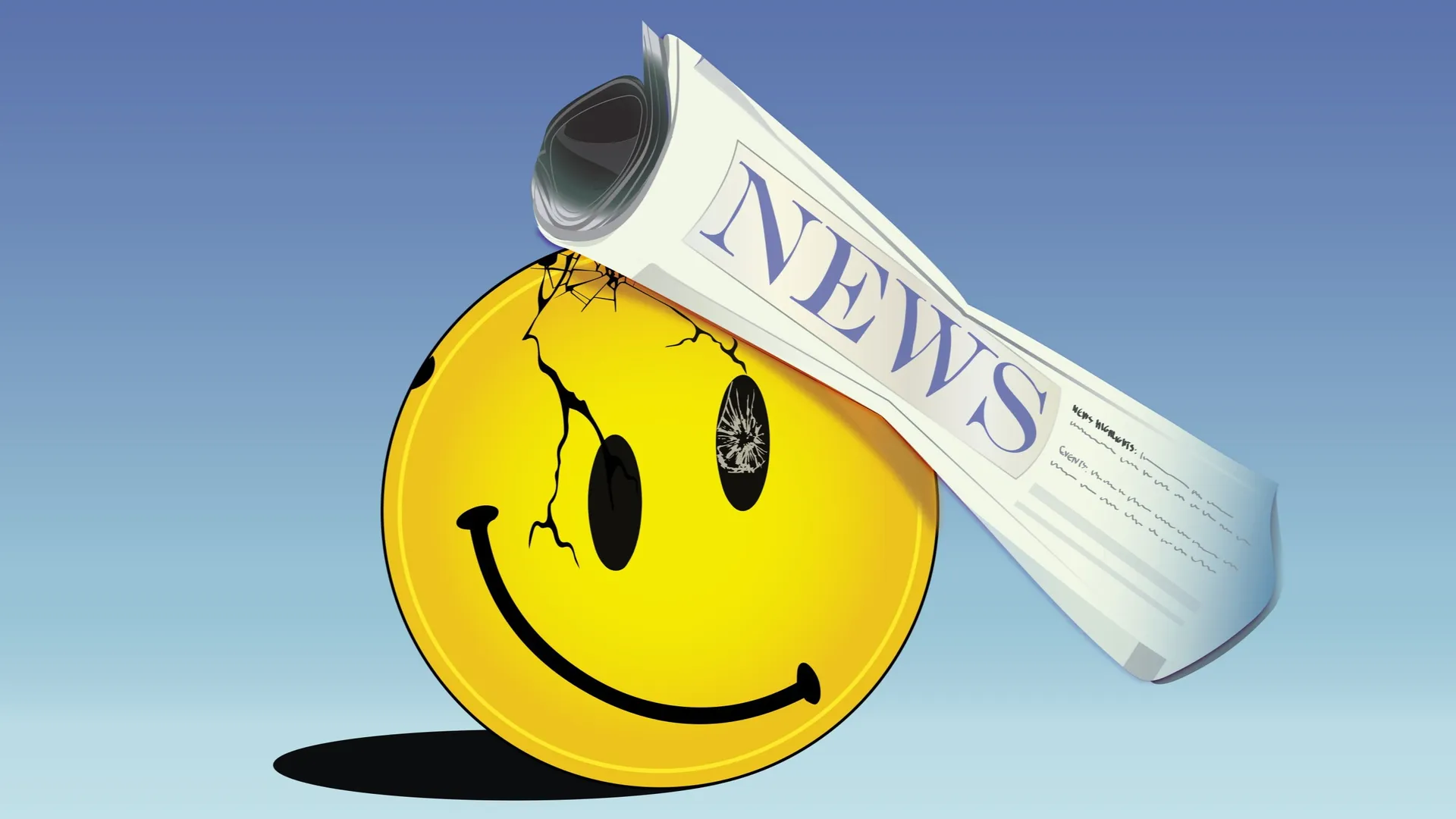尊敬的用戶您好,這是來自FT中文網的溫馨提示:如您對更多FT中文網的內容感興趣,請在蘋果應用商店或谷歌應用市場搜尋「FT中文網」,下載FT中文網的官方應用。

I have something of a confession to make: I really love listening to the kinds of podcasts that, if they were titles in a bookshop, would be found in that most ugly-sounding of sections: “self-help”. I suppose I listen, on and off, to a good half-dozen or so of them — they keep me company when I’m doing chores, they motivate me, and they often give me fresh ways of thinking about my life (and even about some of the subjects I write on).
我有一個小小的坦白:我非常喜歡聽那些在書店裏會被歸類爲「自助」那一類的播客。我斷斷續續地聽了大約六七個——它們在我做家務時陪伴我,激勵我,並且常常帶給我對生活的新思考(甚至是我寫作的一些主題)。
But, in recent months, I have noticed a slightly troubling trend on these podcasts: many of them seem to be recommending that, in order to, you know, “live your best life”, you should switch off from the news entirely.
但是,最近幾個月,我注意到這些播客中出現了一個略微令人擔憂的趨勢:許多播客似乎都在建議,爲了『過上最好的生活』,你應該完全遠離新聞。
I should make it clear that I do not think we should all be the kind of “news junkies” who keep up with every incremental development of a story as if that were some kind of civic duty. At the risk of sounding like one of the self-help podcasters myself, feverishly following these “BREAKING NEWS” alerts as if they were goals in a football match is often simply an escape from dealing with the more complicated and fraught areas of one’s life.
我應該明確指出,我並不認爲我們都應該成爲那種對每個故事的每一步發展都保持關注的「新聞癮君子」,好像那是某種公民責任。冒著聽起來像自助播客的風險,狂熱地關注這些「突發新聞」警報,就像關注足球比賽中的進球一樣,往往只是爲了逃避處理生活中更復雜、更棘手的領域。
But I do worry — and not just for the sake of my gainful employment — about what appears to be a broader switching off from what is going on in the world. A report published over the summer by Oxford university’s Reuters Institute found that a record high of 39 per cent of people worldwide say they sometimes or often actively avoid the news, up from 29 per cent in 2017.
但我確實擔心——不僅僅是爲了我的謀生——似乎有更多人對世界上正在發生的事情漠不關心。路透社研究所(Reuters Institute)今年夏天發佈的一份報告發現,全球有39%的人表示他們有時或經常主動迴避新聞,比2017年的29%有所增加,創下歷史新高。
In Britain, the decline in engagement over the past decade has been especially staggering — 46 per cent now avoid the news, up from 24 per cent in 2017, while interest has also plummeted: just 38 per cent of Brits say they are “very” or “extremely” interested in the news, down from 70 per cent in 2015. In America, with its news-as-entertainment cable news culture, interest is a little higher, but it has fallen there too: from 67 per cent to 52 per cent over the same period.
在英國,過去十年中參與度的下降尤其驚人——現在有46%的人迴避新聞,而2017年這一比例爲24%,同時對新聞的興趣也大幅下降:只有38%的英國人表示他們對新聞「非常」或「極其」感興趣,而2015年這一比例爲70%。在美國,由於其將新聞作爲娛樂的有線電視新聞文化,人們的興趣稍高一些,但在同一時期也有所下降:從67%下降到52%。
Social media platforms like X or TikTok tend to be the scapegoats for all the ills of my industry.
像X或TikTok這樣的社群媒體平臺往往成爲我所在行業所有問題的替罪羊。
But engagement in the news on these sites is also falling: a recent survey by market research firm GWI found 35 per cent of Americans have reduced their social media consumption over the past three months, with almost half citing political discussions as the reason for pulling back, and 30 per cent saying political content “negatively impacts mental and emotional wellbeing”.
但這些網站上的新聞參與度也在下降:市場研究公司GWI最近的一項調查發現,35%的美國人在過去三個月裏減少了社群媒體的使用量,其中近一半的人將政治討論作爲減少使用的原因,30%的人表示政治內容「對心理和情緒健康產生負面影響」。
That people should want to protect their mental health by switching off from the news sometimes is totally understandable. (I regard regularly switching off from the internet as a whole as an excellent idea, and undertake self-imposed digital detoxes myself.) And when the news is particularly distressing or frightening, avoiding it might indeed be helpful: a study conducted in the first few months of the Covid-19 pandemic in the Netherlands found that news avoidance was associated with higher levels of perceived wellbeing.
人們有時候希望透過關閉新聞來保護自己的心理健康是完全可以理解的。當新聞特別令人痛苦或恐懼時,避免它可能確實有幫助:在荷蘭進行的一項研究發現,新聞迴避與更高水準的主觀幸福感相關聯。
But to disconnect from the news entirely is to suppose that someone else has done the work for you; that someone else can tell you what’s true and what’s false, who is right and who is wrong. It is also, in a democracy, to relinquish both the privilege and the responsibility of holding our leaders to account. How are we to ensure our nations are governed effectively, and that the right leaders get into power in the first place, if we know nothing of the candidates on offer, nor of the issues they propose to tackle?
但完全脫離新聞就等於假設別人已經爲你做了這項工作;別人可以告訴你什麼是真,什麼是假,誰對誰錯。在民主國家,這也意味著放棄了追究領導人責任的特權和責任。如果我們對候選人和他們提出的問題一無所知,我們如何確保我們的國家得到有效治理,並確保正確的領導人首先上臺執政?
Our fractured, algorithm-driven attention economy has already made it difficult to agree on what is real and true. And while our much-maligned “mainstream media” institutions must certainly do better at pursuing objectivity, turning off from them can surely only make the prospect of common truths dimmer, while distortions in people’s perceptions of reality become more prevalent.
我們碎片化的、演算法驅動的注意力經濟已經讓人們很難就什麼是真實和真理達成一致。雖然我們備受詬病的「主串流媒體」機構肯定需要在追求客觀性方面做得更好,但是拒絕接受它們的影響只會讓共同真理變得更加黯淡,同時人們對現實的看法扭曲也會更加普遍。
I was struck, recently, by a chart from Gallup, showing Americans’ perceptions of the state of crime at both a local and a national level. According to the FBI, violent crime fell by almost half between 1993 and 2022. While only 17 per cent in Gallup’s 2023 survey said the crime problem in their area was either “very” or “extremely” serious, almost four times as many — a record 63 per cent — said the same of the situation in America as a whole. Similar perception gaps can be seen in the way Americans view the state of their economy.
最近,我被蓋洛普的一張圖表所震撼,該圖表顯示了美國人對本地和全國犯罪狀況的感知。根據美國聯邦調查局(FBI)的數據,1993年至2022年間,暴力犯罪減少了近一半。在蓋洛普2023年的調查中,只有17%的人表示他們所在地區的犯罪問題「非常」或「極其」嚴重,而近四倍的人(創紀錄的63%)則表示美國整體狀況如此。類似的感知差距也存在於美國人對經濟狀況的看法中。
Such distortions are all too easily exploited, of course, by people who deal in deliberate untruths, who sell them as facts — sometimes terrifying ones — and who offer simple, but wrong, solutions to them. In our utterly overwhelming world, disengagement from reality might seem like another easy answer. Alas, again, it is almost certainly not the right one.
當然,這種扭曲很容易被那些故意散佈謊言的人利用,他們將謊言當作事實出售——有時是令人恐懼的事實——並提供簡單但錯誤的解決方案。在我們這個不堪重負的世界裏,脫離現實似乎是另一個簡單的答案。唉,這幾乎肯定不是正確的答案。